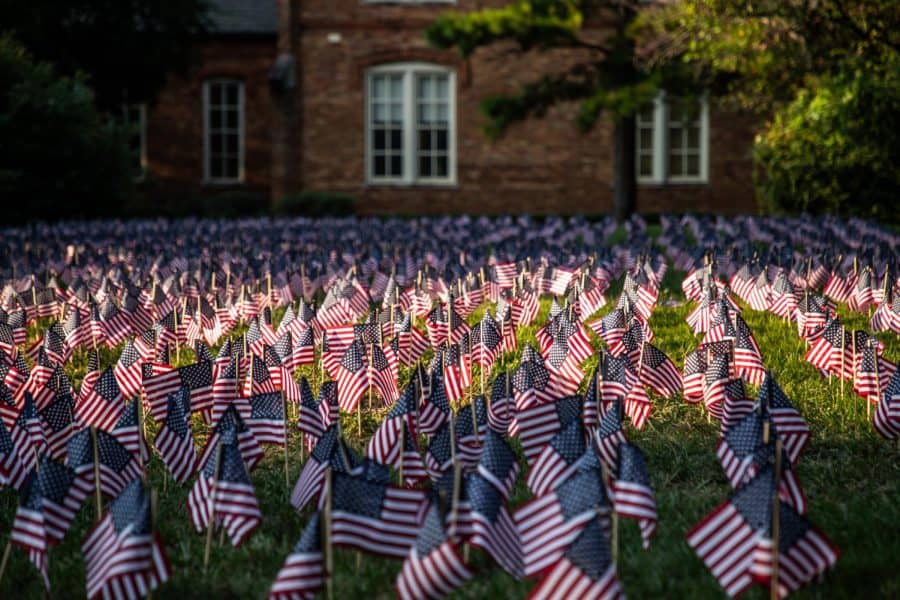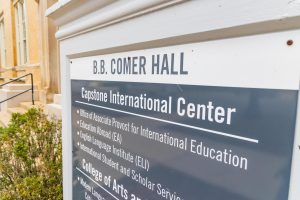Opinion | Never forget 9/11 or its disastrous consequences
September 15, 2021
Saturday marked the 20th anniversary of the Sept. 11, 2001, attacks on the World Trade Center and the Pentagon. This Saturday, Sept. 18, will mark twenty years since the Authorization for Use of Military Force of 2001 was passed.
It will be twenty years since that act irreversibly changed the balance of power in the federal government. It is an anniversary that commemorates violence, abuse of power and economic disarray in the name of patriotism.
To many, it is still simply unfathomable how a group of people could perform an act of such unadulterated evil as the events of 9/11. The event continues to haunt our collective public consciousness as we mourn the lives lost. Many citizens vow never to forget the tragedy of that day.
What the Al-Qaeda terrorists did that day was inhuman. To kill an innocent person is perhaps the most reprehensible crime one can commit against humanity. That is why our promise to “never forget” must also include remembering the disastrous consequences of our national response to 9/11.
Less than a month after the attacks, the U.S. invaded Afghanistan under the pretense of locating and eliminating Al-Qaeda leader Osama bin Laden. American troops stayed there until this past August, making the war in Afghanistan the United States’ longest ever.
During that time, 2,448 American service members, 444 aid workers, 72 journalists and 47,245 Afghan citizens were killed. The loss of 2,977 lives on 9/11 was met with even more innocent deaths. Fire was fought with fire.
All of these deaths, and the War in Afghanistan itself, were only possible because of the passage of the Authorization for Use of Military Force on Sept. 18, 2001. This one act has undermined our political structure for decades.
This resolution (which would have been unanimously passed by Congress if not for the brave defiance of Rep. Barbara Lee) sidestepped the Constitution, granting the president power to enact military revenge against anyone who “planned, authorized, committed, or aided the terrorist attacks that occurred on September 11, 2001, or harbored such organizations or persons.”
Our hasty response to 9/11 wrought a political cost; it saw a crack begin to form in the founders’ conception of the “separation of powers.” The AUMF took a chunk of the legislature’s power and handed it to the executive branch. The right to declare war, which many would consider Congress’ most important power, was handed to an individual.
The AUMF has allowed the president to carry out military actions in at least 14 different countries since 9/11 without the approval of Congress or the American people. Because of the AUMF, American citizens have no say in the cause that they die for.
The military actions sanctioned by the AUMF cause the destabilization of international relations and foreign governments, which oftentimes perpetuates even more war, death and terrorism.
It is also abundantly clear how the aftermath of 9/11 led to social injustice in the United States. It would be ignorant to think that acts such as the AUMF are limited to the political sphere. Legislation dictates public opinion; it allows citizens to view their peers as threats, and as an “other.”
We have seen a rise in discrimination toward Muslims and people from Muslim countries in the last 20 years. From 2000 to 2001, the annual tally of hate crimes against Muslims in America skyrocketed from 28 to 481. Even today, prejudice remains. To recognize this fact, one only needs to look at President Trump’s 2017 travel ban, which targeted predominantly Muslim countries.
The enactment of the AUMF perpetuated abusive legislation and unchecked power. It paved the way for the infamous USA Patriot Act, a piece of legislation enacted 45 days after 9/11 that has irrevocably shaped the American right to privacy. The act, still in place today, grants the federal government authority to pursue more extensive invasions of individual privacy through roving wiretaps and “sneak-and-peek” search warrants, for example, in the name of counter-terrorism.
We cannot ignore the economic costs of America’s post-9/11 wars in Afghanistan and Iraq. These wars were funded on credit, unlike most other wars in American history. Historically, wars were paid for by increased tax rates and limited governmental spending. The novel use of credit has caused our national debt to balloon. Because of this, Americans will continue to be financially burdened by the war in Afghanistan for generations despite its recent conclusion.
Additionally, 90% of the funding for these wars came through “supplemental appropriations” instead of the traditional defense budget. This eliminated any spending cap that would normally be in place. It allowed war spending to occur unchecked without any offsetting cuts in the budget. Such a process is less transparent and decreases accountability.
Linda J. Bilmes of Harvard’s Kennedy School concludes that America’s method of paying for these wars will have concerning effects on how public policy will operate in the future, including “weakened fiscal discipline over the defense budget,” “failure to provide resources for accrued promises to veterans” and “making it easier to engage in war and to prolong war.”
The benefits of increased national security and a brief moment of American unity seem to pale in comparison to the negative repercussions of the United States’ reaction to 9/11. How can one confidently say that we had the proper response to the devastation of that harrowing day when that response, including the AUMF, has led to even more devastation on multiple fronts?
Sept. 11, 2001, was a day of immeasurable trauma and loss. When an individual suffers a traumatic experience, we give them some leniency; we may forgive them for lashing out or acting irrationally. However, we do not forgive someone if they use their loss as an excuse to harm others. We cannot make exceptions for our country. As many children are taught from a young age, “two wrongs do not make a right.”
What the Al-Qaeda hijackers did on 9/11 was despicable, but much of what the United States did in response was also wrong. America has only promised to remember that day up until 11:59 p.m., blatantly ignoring its subsequent actions and the decades-long consequences which have followed.
We absolutely must never forget. We must never forget how 9/11 damaged our nation, stole the lives of thousands of innocent people and traumatized countless American families. We must also never forget how it caused a knee-jerk reaction in the hearts and minds of all Americans, especially those in Washington, which led us to war, authoritarianism and economic peril. In our quest to remember the 11th, we must also remember the 18th, the implementation of the Patriot Act on the 26th of October, and every day since that Americans have faced discrimination and economic insecurity.
We must never forget the way we responded to 9/11 because we can never allow it to happen again. Unfortunately, we will continue to live with the consequences of the AUMF, the Patriot Act, the national debt and the wars in Iraq and Afghanistan for the foreseeable future, but we can start to reverse the damage if we recognize the reality of these repercussions. And if the worst happens, if we ever experience another attack close to the scale of 9/11, we must choose to respond with reason, compassion and peace — not impulse, hatred and war.
History and political science professors here at The University of Alabama can help us understand these consequences by adding nuance to their teachings of 9/11.
If a course covers the Sept. 11 attacks, then it should also cover America’s response to the event and the consequences of that response. It is important to note that many current students at the University (including me) have only ever lived in a post-9/11 world, making the manner in which our professors frame it in the greater scheme of American history all the more important. And as a political science major myself, I know that I would appreciate a more comprehensive examination of 9/11 and its aftermath when it is applicable in the classroom.
As students, we are here at The University of Alabama to become the leaders of tomorrow; gaining a better understanding of the world around us is an integral part of that process. Today, that means understanding a world that has been forever changed by 9/11. We must honor those who lost everything that day by doing better as we begin to lead the America of tomorrow.




















![UPDATE | New details have emerged about U.S. Immigration and Customs Enforcement’s arrest of doctoral student Alireza Doroudi.
— Yesterday, a University spokesperson confirmed that a doctoral student was arrested by federal immigration authorities, without providing the student’s name, declining to share specific information due to federal privacy laws.
“International students studying at the University are valued members of the campus community, and International Student and Scholar Services is available to assist international students who have questions,” said Alex House, associate director of media relations for the University. “UA has and will continue to follow all immigration laws and cooperate with federal authorities.”
— An employee at the Pickens County Jail confirmed that Doroudi is being held there, adding that the facility typically sends ICE detainees to a detention facility in Louisiana.
— The Department of Homeland Security provided a statement about Doroudi’s arrest:
“ICE HSI [Homeland Security Investigations] made this arrest in accordance with the State Department’s revocation of Doroudi’s student visa. This individual posed significant national security concerns,” a DHS spokesperson said. The statement did not provide details about why it claimed Doroudi posed national security concerns.
— Students for Justice in Palestine at UA, formerly known as Bama Students for Palestine, said in a statement on social media Thursday that it was “outraged” to learn of his detainment and that he "was not involved, nor has he ever been involved in any organizing or protests related to our organization."
This is a developing story and will continue to be updated. Read the updates at the link in our bio.](https://scontent-iad3-1.cdninstagram.com/v/t51.75761-15/486944895_18492822301025566_6944596333023050206_n.jpg?stp=dst-jpg_e35_tt6&_nc_cat=107&ccb=1-7&_nc_sid=18de74&_nc_ohc=hnp26Pzwsm0Q7kNvgH09W0S&_nc_oc=AdmIBEMuR_aRgaBd00Hlot3E59Vj_4lQyCImLLgp8CLdbxpSmLU25dhU_MO_Zul-qcU&_nc_zt=23&_nc_ht=scontent-iad3-1.cdninstagram.com&edm=AM6HXa8EAAAA&_nc_gid=TrtEH4ztjEFIxI2pfptpVg&oh=00_AYGxfMQa6NhR7vkkV4PcL6a2ucBT7GS7C5yYJQcyAqSaow&oe=67F343F0)
